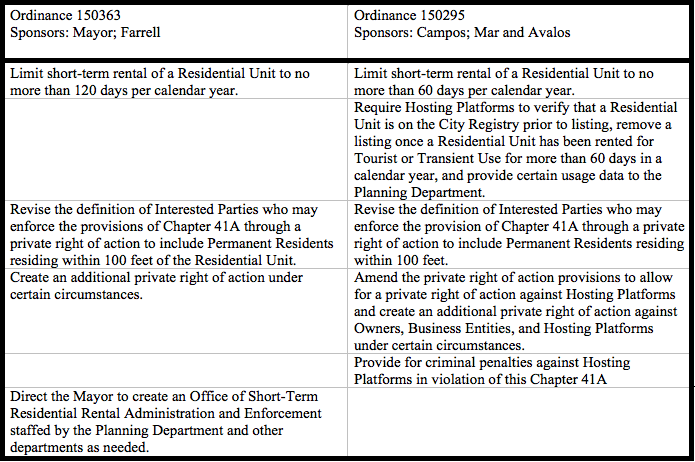BuzzFeed reports on the increasing number of Southern California cities banning or taking steps to ban Airbnb. Meanwhile, San Francisco – home of Airbnb HQ and apparently resigned to its fate – is focused more on legitimizing and regulating a service that diverts as many as 1,960 rental units from San Francisco’s housing supply.
KQED Reports on the Impact of Short Term Rentals on Berkeley Renters
KQED reports on the impact of short term rental platforms, like Airbnb, on Berkeley renters. In addition to the constraints on housing supply for residents, at least one resident has had to hunt down the new codes to new his building’s gate (changed to accommodate Airbnb guests) from the property manager.
The article also notes that prices run the gamut from $700/night, for a house with pool, to $26/night, for a room in an apartment with UC Berkeley Students… which – speaking of the sharing economy – is actually cheaper than a Lyft back to the City after BART closes.
Competing Bids To Revise San Francisco’s “Airbnb Law”
The use of Airbnb in San Francisco is becoming increasingly politicized in San Francisco. Earlier this year, the company paid a (somewhat voluntary) hotel tax, believed to be $25 million. However, while Airbnb’s CEO has urged that hosting has a de minimis impact on rental prices, a recent report by the Budget and Legislative Analyst’s Office suggests that the effect of the several thousand diverted units is significant.
Two proposed amendments to the current law governing short-term rentals are competing to address the problem.
As compared to the current law, the version sponsored by Mayor Lee actually increases the allowable number of hosted days per year. Both versions seek to increase enforcement of the regulations, for example, by creating private rights of action and expanding the definition of “interested parties” who may sue to enforce. The main difference in enforcement is that the version sponsored by Supervisor Campos would put the burden on the hosting companies themselves, whereas the Mayor’s would create an Office of Short-Term Residential Rental Administration and Enforcement, specifically tasked with enforcement, which would take pressure off of the Planning Department.
Two Wrongs Do Not Make a Right (to Airbnb)
SocketSite reports that San Francisco landlords, who used the Ellis Act to remove rent-controlled tenants, and who subsequently used their property for Airbnb – in a glorious double-violation of both the Residential Unit Conversion Ordinance and the Rent Ordinance – settled a lawsuit filed by San Francisco City Attorney Dennis Herrera for $276,000.00.
Op-Ed on “Airbnb Law” from Supervisor Campos in SF Examiner
This week’s Examiner features an Op-Ed from Supervisor Campos on his proposed amendment to the new “Airbnb Law”, seeking to give “teeth” to the recent regulation of transient use of San Francisco’s rental housing stock.
San Francisco Lawmakers “Sharing” in the Task of Amending the New “Airbnb Law”
Mayor Lee and Supervisor Farrell introduced an amendment to the new “Airbnb law” this week. Currently, an overloaded Planning Department has been charged with regulation of Airbnb (and other short term rental) listings. This comes on the heals of another amendment proposed by Supervisors Campos and Kim, and mere months after the original ordinance took effect.
The Lee/ Farrell amendment would create a new office, the Office of Short-Term Rental Administration and Enforcement, which, as the name suggests, would be able to focus more singularly on this type of housing use, which The Chronicle estimates to affect 5,000 homes in the City for Airbnb listings and another 1,200 for VRBO.
Meanwhile, Airbnb CEO Brian Chesky appeared on APM’s Marketplace this week and explained that Airbnb’s own studies show that Airbnb either has no impact or a de minimis impact on rental prices and that it is actually allowing people to stay in their homes… so no one has anything to worry about.
The amendment would also increase the limit for allowable listings to 120 days per year, up from 90 in the existing version.
SocketSite Reports on New “Group Housing” Developments
SocketSite reports on new “group housing” units (buildings with single units but enough shared amenities to avoid “below market rate” unit requirements) targeted to San Francisco’s “working class”, who finally have an incentive to earn 150% of the “area median income”.
The Bold Italic on the 415% Rent Increase in the (415)
The Bold Italic reports that the Bernal Heights tenant, whose 415% rent increase notice has been doing laps around the internet, has been using her home to host Airbnb guests.
In a series of steps toward legitimizing the practice, Airbnb recently “volunteered” a 25 million dollar tax payment to San Francisco, and the City recently enacted new “hosting platform” legislation, where tenants who comply with its procedures would not be subject to the “just cause for eviction” provisions of the Rent Ordinance for a first violation of the residential unit conversion ordinance.
San Francisco Legislative Update for 2015: Amending Regulation of Short-Term Residential Rentals and Establishing Fee

Ordinance 218-14 will become operative on February 1, 2015. It is a big piece of a broader effort by San Francisco to regulate AirBnb, VRBO and other hosting platforms in the increasingly popular “sharing economy”. The changes impact the eviction provisions of the Rent Ordinance, as well as the interpretation of this kind of use within the Residential Unit Conversion Ordinance. The short version is that owners may not offer rental units on hosting platforms, and tenants might be able to, under certain conditions.
In order to comply, a tenant has to register the unit with the new Planning Department registry for keeping track of transient use. They have to obtain insurance and a business license, pay the transient occupancy tax. They must occupy the unit for at least 275 days out of the year (or 75% of a prorated year), and they cannot profit off the “subletting” (to the extent they are subject to the rent-control provisions of Section 37.3 of the Rent Ordinance).
This new exception expressly does not supersede restrictions against housing platform listings in CC&Rs, leases or TIC agreements, so, as with many landlord-tenant issues, the first place to check for authorization is the lease agreement itself.
The biggest change for landlords is probably the new language in Rent Ordinance Section 37.9(a)(4): “The tenant is using or permitting a rental unit to be used for any illegal purpose, provided however that a landlord shall not endeavor to recover possession of a rental unit solely as a result of a first violation of Chapter 41A that has been cured within 30 days written notice to the tenant.” (New language in bold.)
Legislative language available here.






